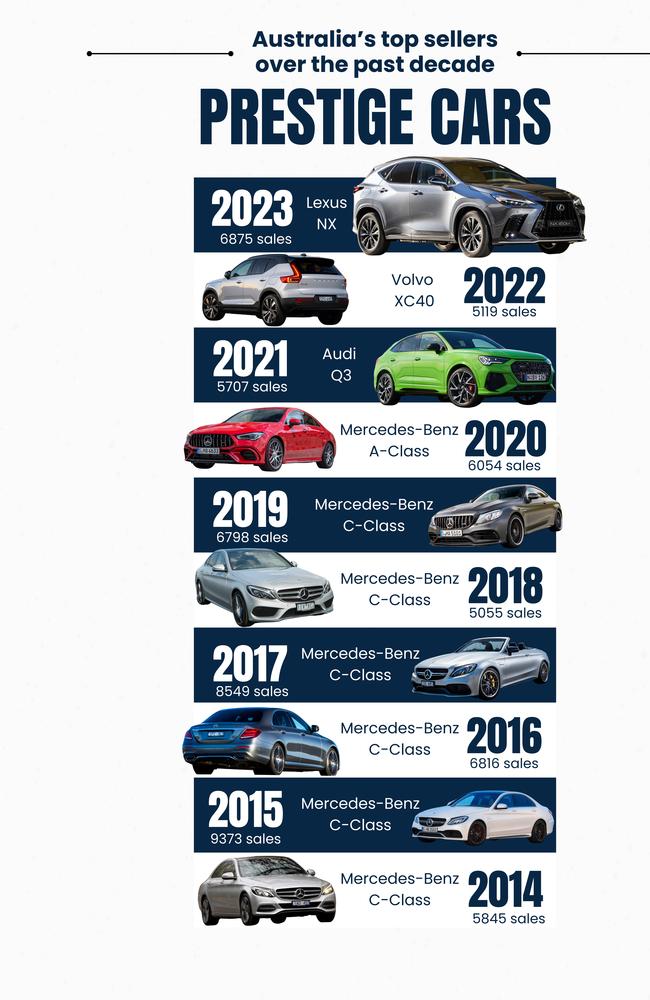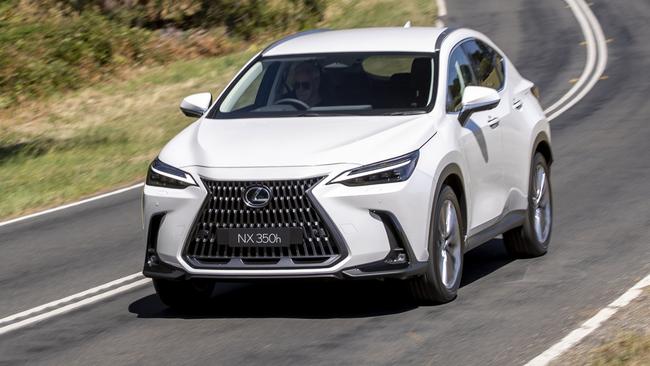Hybrids turbocharges brand up the luxury leadership board
This sensible SUV outguns Europe’s finest prestige brands to lead Australian luxury car sales.
Motoring News
Don't miss out on the headlines from Motoring News. Followed categories will be added to My News.
Lexus has timed its hybrid run to perfection.
The Japanese luxury brand has boosted itself to become the biggest improver among the traditional prestige marques in recent years.
According to data from industry statistician VFACTS, Lexus more than doubled its 2022 sales last year.
That achievement has been driven by sales of Australia’s most popular luxury car, the Lexus NX – a mid-size SUV where hybrid and plug-in hybrid account for nearly half of sales.
The trend has continued throughout 2024 with the NX maintaining its number one spot up until the end of September – more than 1000 units ahead of Audi’s Q3, followed by BMW X1 and X3 duo.

Last year about 60 per cent of NXs were hybrid or plug-in hybrid, and that has risen to 75 per cent this in 2024.
The most popular seller is the 350h, which starts from $78,560 drive-away for the front-wheel drive version and more than $83,400 for the all-wheel drive.
A Lexus spokesman said the luxury marque had taken a “multi-pathway approach” to drivetrains and customers had the best of both worlds with hybrid through financial savings and reducing their carbon footprint.
“It’s the sensible choice for many consumers. They are looking for something that makes sense from an ownership perspective,” he said.
“We are still developing our electric infrastructure as a nation. Hybrids appeal to the rational and emotional side.”

But the nation’s leading prestige performer is BMW.
The Bavarian brand overtook Mercedes-Benz last year to sit atop the prestige dais, and the trend has continued in 2024 with Audi ranked third.
BMW Group Austraia chief executive officer Wolfgang Buechel said the company tactic of a wide variety of powertarains had been pivotal in achieving the number on position, along with the partnership with the 49 independently owned dealerships.
“We’ve refined our suite of ownership services, including expanding our new car warranty from three to five years and offering highly competitive novated leasing packages on our battery electric vehicle offerings that are priced below the luxury car tax,” he said.
Having six EVs below the LCT threshold has played a key role in the brand’s success.
“It has opened up new opportunities for BMW to offer fully electric products to an entirely new customer base, and we are pleased with the strong response,” Mr Buechel said.
“BMW is the best-selling premium brand in the country, and we rank third in fully electric sales among all manufacturers in the local market. We currently offer 16 fully electric variants, the most of any manufacturer, and the six priced below the LCT currently account for 85 per cent of our total BEV volume.
“In the coming years we will launch the Neue Klasse models – an entirely new, next generation line-up of cars that are designed, developed and produced in an entirely different way to what we’ve done before. The Neue Klasse line-up will integrate revolutionary electric drive and battery systems, platforms, technology, design and sustainability elements including a higher than ever use of recycled materials.”
Luxury car sales have softened this year after a record-breaking 2023.
Porsche was the only top 10 marque to be in positive sales territory at the end of September compared to the same time last year.
BMW has maintained consistent sales over the past decade whereas Mercedes-Benz has dipped off the back of its agency model introduced in January 2022 – where dealers no longer haggle with buyers for discounted deals.
Australia’s leading EV manufacturer Tesla would have also played a role, with the Model 3 and Model Y accounting for more than 23,000 sales in 2024.
Mercedes sales are down nearly 20 per cent compared to the same time last year, Audi is down 18 per cent, as is the BMW-owned brand Mini.
Federal Chamber of Automotive Industries chief executive Tony Weber said the definition of what is considered a luxury continued to evolve as new models with improved functionality continue to be released in Australia.
“Safety, environmental, performance and entertainment features that were once only available on luxury models are now available across almost all product offerings, although luxury brands most often led the introduction of leading technical innovation,” he said.
“Luxury brands in Australia continue to offer world leading innovation across a broad spectrum of features beyond comfort and ride.
“That is why we continue to make a case for the removal of the luxury car tax. It is an outdated and inefficient tax that only penalises consumers who want and can afford the latest safety, environmental and connectivity features.”
Originally published as Hybrids turbocharges brand up the luxury leadership board





